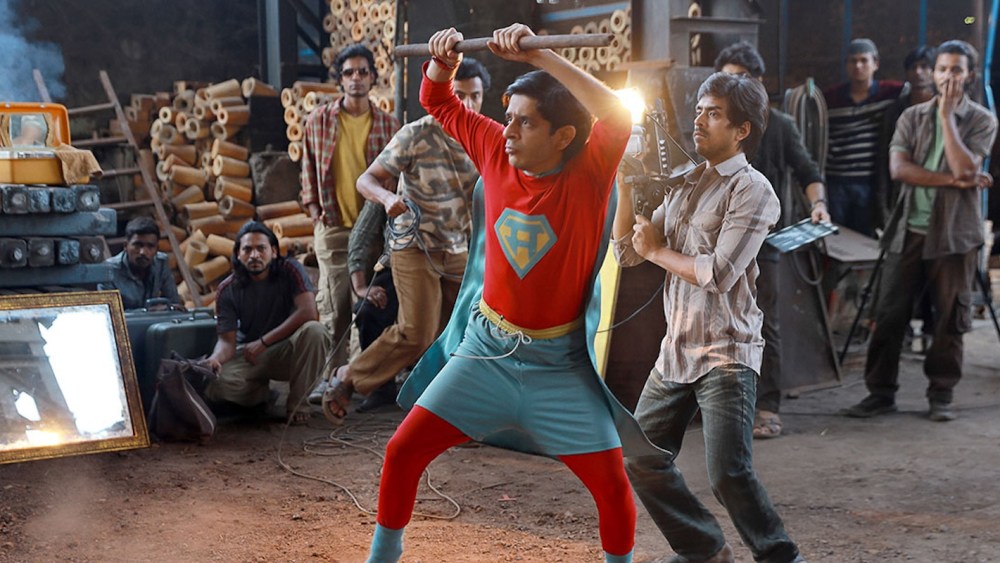Reema Kagti’s Superboys of Malegaon follows a bunch of small-town DIY Indian filmmakers and is a deeply transferring crowd-pleaser that, by way of its centre, The theme consistently reiterates its significance. Whereas the movie, primarily based on true occasions, typically tries to cowl an excessive amount of, it retains coming again to the concept individuals should see themselves mirrored in artwork, not simply because they need to, however as a result of A deep need born of necessity, to dwell with dignity.
The Bollywood biopic, which spans occasions from 1997 to the early 2010s, facilities on photographer and marriage ceremony photographer Nasir Shaikh (Adarsh Gourav), a younger man dwelling within the small city of Malegaon. A lovelorn man in Malegaon, a metropolis just some hundred miles, or light-years, from Mumbai, India’s monetary and movie capital. Nasir and his brother Nihal (Gyanendra Tripathi) run a failing movie show, insisting on exhibiting classics by Buster Keaton and Charlie Chaplin as an alternative of the most recent Bollywood film, even when it means shedding clients. What Nasir actually needed was to turn out to be a filmmaker, a journey that started by splicing collectively motion movies from totally different eras and nations to create his personal entertaining montages for the general public, though these screenings had been ultimately shut down on account of piracy .
Led by mates and enthusiastic followers, Nasir quickly started engaged on a low-budget manufacturing modeled after the ever present Bollywood basic Sholay, albeit with an area twist to replicate Malegaon’s Humor, individuals and feelings. This process-oriented a part of the movie, which takes up the primary half, paves the way in which for Nasir’s native success and his subsequent conceitedness, which led to falling outs with a number of of his teammates, together with His principled screenwriter Farrow (Vineet Singh). In the meantime, Nasir’s loyal finest pal Shafiq (Shashank Arora), a wannabe actor and manufacturing unit employee, is all the time by his facet. This coincides with the second half of the movie, the place Shafiq immediately turns into the primary focus, excluding Nasir and Farrow within the course of, who had been all the time purported to be co-stars.
This structural awkwardness stems from the movie’s try and depict each main occasion within the topic’s life, even though the 2012 documentary on which it’s primarily based, Faiza Ahmad Khan’s Malegaon “Supermen of Malegaon” solely covers one particular parody of Superman: The Film. Whereas the biopic would not delve into the local people tensions the documentary touches on (a cause cited by the true Nasir for his inventive endeavors), the characters within the movie are largely Muslim, and amid rampant propaganda for the movie, The dehumanization of Indian Muslims is price contemplating.
Varun Grover’s script provides years of context to each determination on this superhero spoof, whereas additionally including indelible (and tragic) context to the documentary and the parody it depicts , whereas reworking the movie’s personal scrappy story of creativity right into a spiritually transferring have a look at the that means of cinematic pictures and the immortality they provide. Its stunning climax completely enhances Spanish maestro Victor Erice’s current comeback track “Shut Your Eyes,” which isn’t any imply feat.
Though the damaged bonds are repaired too rapidly, the movie’s feel-good drama is immediately participating, due to its stellar solid, who’re well-known to Indian audiences although (in Gourav’s case, additionally by way of Netflix’s “The White Tiger” (recognized to Western audiences) will not be large stars. This helps protect the grounded really feel of the movie. The performances stroll a nice line between the melodrama of Bollywood and the naturalism of Indian “parallel” cinema, which ensures that the characters’ interpersonal conflicts are consistently boiling over however stay eminently human and acquainted. Whereas a lot of the humor relies on references to “Sholay” – comprehensible, given the parody’s centrality to its story – even viewers unfamiliar with the Hindi blockbuster are more likely to catch it. lives as much as the characters’ unrealistic creative ambitions, regardless of their humble beginnings.
There’s additionally a sly metatextual component to this “Sholay”-centric phenomenon. “Malegaon” is produced by “The Archies” director Zoya Akhtar and “Dil Chahta Hai” director Farhan Akhtar, the kids of “Sholay” co-writer Javed, who additionally composed the lyrics for the background track in Kagti’s movie. The Akhtars have lengthy been an business household, however “Superboys” looks like a mutual homage to a bunch of outsiders who used Javed’s work to launch their inventive journeys.
The result’s a deeply transferring ode to filmmaking that overcomes an uneven construction and achieves hasty reconciliation by way of the sheer energy of Caghetti’s intimate moments. By the point the film ends, these emotions are big. And, when watching Malegaon Superboy with the proper viewers—just like the excited, largely Indian crowd on the movie’s Toronto premiere—one other meta-layer emerges. The display stuffed with cheers and whistles because the movie’s townsfolk immersed themselves in a cinema that catered to their wants. After some time, these raucous reactions merged with these of the viewers within the theater, making a uncommon type of emotional immersion from the group. Few films are so good at capturing why individuals nonetheless go to the films.

